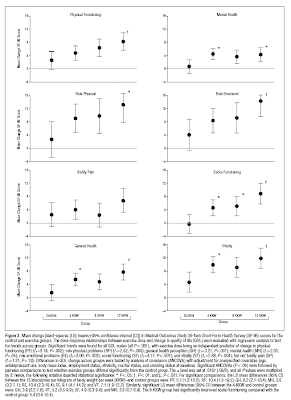
You can click on the chart to expand it; the chart above is from a randomized, controlled, 2009 study by CK Martin et al., published in the major journal Archives of Internal Medicine, in which 6 months of regular aerobic exercise is shown to improve numerous domains of quality of life, including mental health, vitality, and social functioning, in a group of 430 sedentary postmenopausal women.
To interpret the chart, look at each symptom domain. There is a control group (which did not exercise), then groups which exercised approximately 1, 2, and 4 hours per week, with the groups which exercised more represented towards the right-hand side of the chart.
The improvement in quality of life did not depend on any weight loss occurring with the exercise. And it appeared that as little as an hour a week of exercise was beneficial, though 2-4 hours per week were slightly more beneficial than just one. Here's a link to the abstract:
http://www.ncbi.nlm.nih.gov/pubmed/19204218
As a cautionary note, I find "exercise addiction" to be another potentially serious problem, which could substantially REDUCE quality of life. The above data support a very modest amount of exercise, in the order of 4 hours PER WEEK , for improving quality of life.
I strongly encourage people to exercise. I believe it is basic self-care, a requirement for health.
It is intuitively obvious that exercise would be beneficial for psychological health, and be a good potential therapy for depression or anxiety.
Yet, there is an important recent study of over 5000 Dutch twins, which shows that exercise did not have a direct influence on anxiety or depression. This is a surprising result, but it needs to be taken seriously. Twin studies are very powerful in research, since they look at individuals who are genetically identical -- any differences in symptoms would have to be caused by environmental factors, as opposed to genes. Twins who exercised more than their co-twins were not in fact any less anxious or depressed. (Actually, as I look at the results directly, I see there was a small association, but it was judged to be "non-significant")
The study did confirm that people who exercise are, on average, less anxious and depressed than those who do not exercise. But the conclusion was that this is not because exercise improves emotional symptoms -- it is because there is a genetic factor which predisposes some people both to exercise more, and to have fewer psychological symptoms.
Here is a link to the study:
http://www.ncbi.nlm.nih.gov/pubmed/18678794
On the other hand, there are a few studies which show a therapeutic effect of exercise on psychological symptoms:
http://www.ncbi.nlm.nih.gov/pubmed/17846259
http://www.ncbi.nlm.nih.gov/pubmed/11020092
The above studies show a beneficial effect of exercise, of at least 3 times per week, 30 minutes per session.
Why are there seeming contradictions with these studies?
It may be because the twin study was looking at individuals' intrinsic exercise behaviours, as determined by their life circumstances & inherited factors. Variations in exercise between twins may have been due mainly to opportunity or chance.
The other studies were looking at exercise as a formally prescribed treatment. This would involve a directed change of behaviour, outside of what the individuals would normally do on their own.
It could be that prescribed changes of behaviour, if adhered to for health reasons, could have a stronger therapeutic effect than the behaviours engaged in for other reasons.
It is intuitively obvious that exercise would be beneficial for psychological health, and be a good potential therapy for depression or anxiety.
Yet, there is an important recent study of over 5000 Dutch twins, which shows that exercise did not have a direct influence on anxiety or depression. This is a surprising result, but it needs to be taken seriously. Twin studies are very powerful in research, since they look at individuals who are genetically identical -- any differences in symptoms would have to be caused by environmental factors, as opposed to genes. Twins who exercised more than their co-twins were not in fact any less anxious or depressed. (Actually, as I look at the results directly, I see there was a small association, but it was judged to be "non-significant")
The study did confirm that people who exercise are, on average, less anxious and depressed than those who do not exercise. But the conclusion was that this is not because exercise improves emotional symptoms -- it is because there is a genetic factor which predisposes some people both to exercise more, and to have fewer psychological symptoms.
Here is a link to the study:
http://www.ncbi.nlm.nih.gov/pubmed/18678794
On the other hand, there are a few studies which show a therapeutic effect of exercise on psychological symptoms:
http://www.ncbi.nlm.nih.gov/pubmed/17846259
http://www.ncbi.nlm.nih.gov/pubmed/11020092
The above studies show a beneficial effect of exercise, of at least 3 times per week, 30 minutes per session.
Why are there seeming contradictions with these studies?
It may be because the twin study was looking at individuals' intrinsic exercise behaviours, as determined by their life circumstances & inherited factors. Variations in exercise between twins may have been due mainly to opportunity or chance.
The other studies were looking at exercise as a formally prescribed treatment. This would involve a directed change of behaviour, outside of what the individuals would normally do on their own.
It could be that prescribed changes of behaviour, if adhered to for health reasons, could have a stronger therapeutic effect than the behaviours engaged in for other reasons.